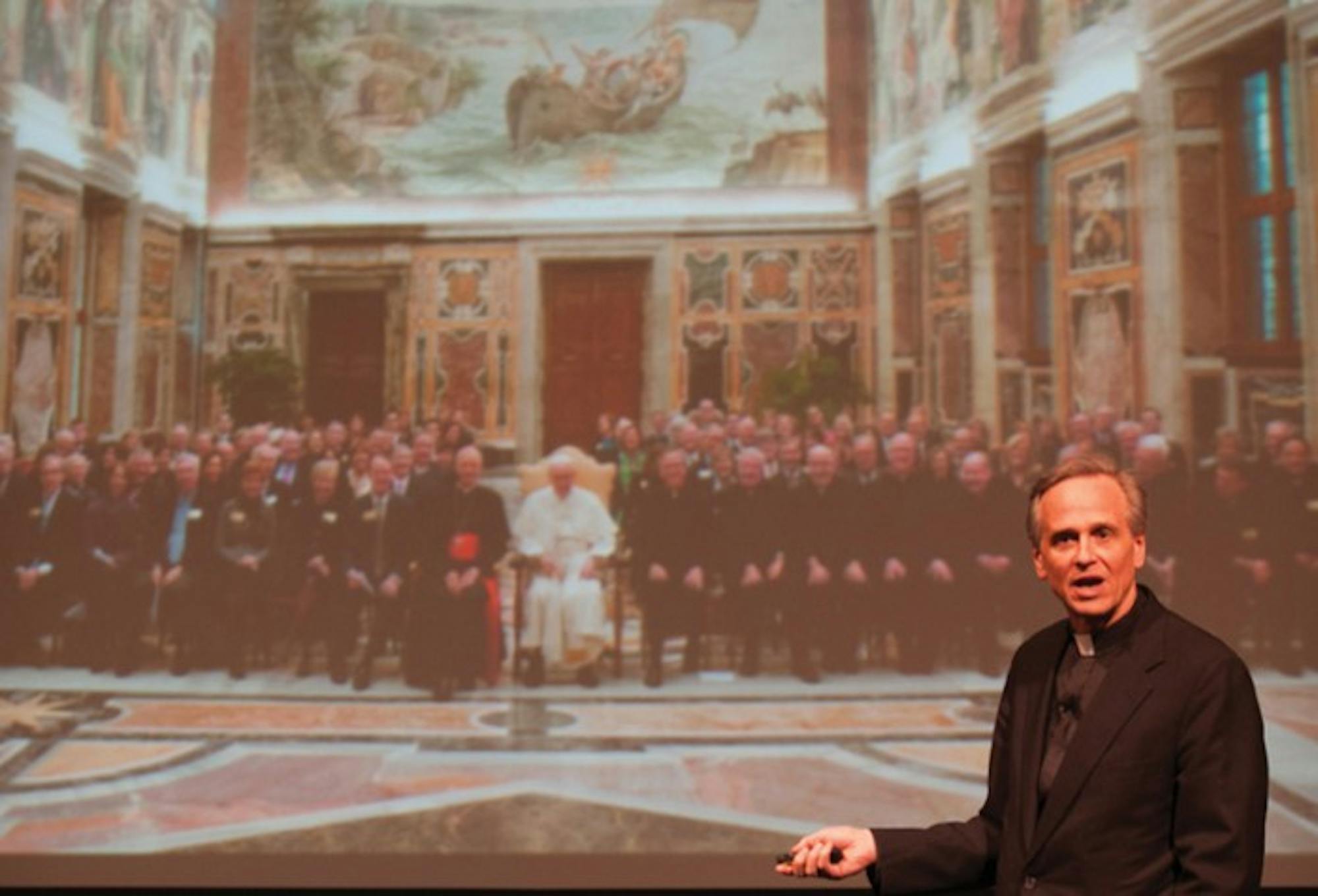In an undergraduate town hall meeting featuring University President Fr. John Jenkins, Vice President for Student Affairs Erin Hoffmann Harding and Dean of First Year of Studies and Associate Provost for Undergraduate Affairs Hugh Page Tuesday evening, Fr. Jenkins announced plans to build two new residence halls, renovate the Hesburgh Library and construct a new multi-disciplinary research facility on campus.

Jenkins said the new dorms will be built directly east of Mod Quad and open in the fall of 2016. This development has become a necessity due to the overcrowding of existing residence halls and the sparse availability of on-campus housing for transfer students.
“One of the most important aspects of Notre Dame, we feel, is the residence halls. Here tonight, you will be the first to know that we will have two new residence halls,” Jenkins said. “The reason we’re going to have that is because the halls are overcrowded … some transfer students can’t get into the dorms, and we need more space so that we can make space for study halls and social space.”
Jenkins said the new halls will be built “through the generosity of a couple of benefactors,” but did not specify who the donors are or how much the buildings will cost.
The renovations to Hesburgh Library are long overdue and will include a more open area on the first and second floors and a new entrance on the north side of the building, Jenkins said.
“When I was an undergraduate a long, long time ago, it looked pretty much like it does now, so it probably needs some renovation,” he said.
“The entrance will allow you to see upstairs and downstairs when you enter,” Jenkins said. “It’s a better gathering place. We also are planning group study spaces.”

The University also plans to erect a new research facility to the east of the library, he said.
“One of the important things at Notre Dame in recent years has been the ever-expanding research work of our faculty,” Jenkins said. “They’re doing important work for labs and research centers.
“It will be a multi-disciplinary facility, so various faculty from various fields can come together on research work.”
Jenkins also addressed the Campus Crossroads Project and said the motivation behind the proposed stadium renovations is to provide much needed class and social space while maintaining the walkability of campus.
“The challenge is we need some more buildings and we’re running out of space,” Jenkins said. “We have this wonderful facility that is used maybe eight times a year. Through a lot of work and a lot of planning we said, ‘Okay, look. This structure is here and it just sits there. Why don’t we use that space to add some needed buildings?’”
He also said the University plans to continue to strengthen its global connections and provide more opportunities to study abroad and inspire faculty collaborations “so that the world can know about Notre Dame and we can know about the world.”
After Jenkins concluded his remarks, Hoffmann Harding began her portion of the presentation and said the University plans to eliminate the hall tax from the dorms.
“What we learned through part of our interview process with students is first of all, [the hall tax] didn’t demonstrate the hospitality we wanted to welcome you into our residential communities,” Hoffman Harding said. “We want to program and offer things for you in our halls, but there were better and more effective ways that we could do that.”
Hoffmann Harding also highlighted last summer’s renovations to Lyons Hall and announced St. Edward’s Hall will undergo renovations this upcoming summer.
Page then took the stage and addressed issues related to the core curriculum. He said the University is currently in the process of reviewing the requirements for undergraduate students.
“As you know, we have a set of requirements for students at the undergraduate level, and the purpose of those requirements is not to make you jump through hoops,” Page said. “The purpose is to make sure that there is a rich and full and meaningful undergraduate education for everyone that gives you the skill sets that you need and imparts the virtues that are necessary for responsible citizenship in the 21st century.”
When the panel took questions from students in attendance, several students raised concerns over the University’s ongoing legal proceedings against the Department of Health and Human Services’ (HHS) mandate for employers to include contraception in their employees’ healthcare plans.
Jenkins said following the most recent rejection of the University’s appeal, the University will temporarily comply with the mandate or else face a fine of one million dollars per day. Jenkins said the University plans to continue its legal action, calling this just “the first inning” of the court battle.
Jenkins also fielded student questions on the Campus Crossroads Project, the Board of Trustees’ audience with Pope Francis and the University’s role in the ongoing conflict in Israel and Palestine, particularly Jenkins’s condemnation of the American Studies Association’s boycott of Israeli academic institutions.













